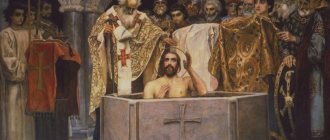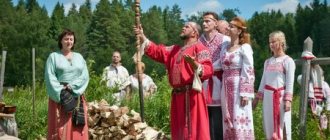Rozuti Robicic
The reason for the well-known feud between the Svyatoslavichs - the brothers Yaropolk, Oleg and Vladimir - was the unsuccessful division of the territory, as a result of which the Kiev prince Yaropolk lost control of the famous route “from the Varangians to the Greeks.” The access to it from the Baltic was controlled by Novgorod of Prince Vladimir, and the land route ran through the Drevlyan lands of Prince Oleg. Yaropolk suffered heavy losses and, apparently, tried to “put pressure” on his brothers, to which they responded with complete disobedience. The reason for the start of the military conflict was the murder by Oleg of the son of the governor Yaropolk while hunting. Oleg had to flee and died from a tragic accident. Yaropolk was not to blame for the death of his brother, but Prince Vladimir and his mentor Dobrynya fled from the same expected fate overseas, to the Varangians. The three years they spent in the lands of the Varangians are shrouded in darkness for historians. What did Prince Vladimir do? What was his social circle? Be that as it may, during these three years he recruited a large, strong army from the Varangians, with which he returned to Novgorod, drove out the posadniks of his brother Yaropolk and declared war on Kyiv.
The prince's path to Kyiv lay through Polotsk, whose ruler, the Drevlyan prince Rogvolod, was needed by Vladimir as an ally. Vladimir's matchmaking with his daughter Rogneda was an important political step. The chronicle brought to us Rogneda’s answer: “I don’t want Rozuti Robichich, but I want Yaropolk.” Some researchers see in this a contemptuous hint at Vladimir’s origins, others see something like: “Yes, he is still a child.” It is obvious that Yaropolk at that time had already secured the support of the Drevlyan prince, which was important for him. Of course, Prince Vladimir could not leave in his rear a man devoted to the enemy. But his reprisal against Rogvolod and his daughter shocks even a modern person, accustomed to the horrors of crime chronicles, with its extremely cynical cruelty: the prince raped young Rogneda in front of her parents, and then killed them, and forcibly took the princess as his wife. In general, it must be admitted that the life of Prince Vladimir before his conversion to Christ represented a real apotheosis of evil.
Reforms
But that will come later. In the meantime, the pagan prince developed vigorous activity: he strengthened, as they would say now, the vertical of power, led campaigns of conquest, and imposed tribute on more and more lands. One of the important components of the prince's reforms was a large-scale religious reform. Prince Vladimir tried to raise the undeveloped pagan cults of Rus' to the level of the official religion of the Byzantine court. Kyiv and Novgorod were covered with numerous temples, at the foot of which human blood flowed. One of the victims of the prince’s pagan madness was a Christian family: Fyodor and his son, the youth John. It's hard to believe that the lot fell on them by chance.
But it is even more difficult to believe that in the ferocious and cruel person that Vladimir appears before baptism, intense internal work was going on, a spiritual search was underway, the secret of which was never revealed to us. This is how Metropolitan Hilarion of Kiev writes about the prince’s conversion in his “Sermon on Law and Grace”: “How did you believe? How did you become inflamed with the love of Christ? <…> How did you seek Christ? How did you surrender to Him? <…> Guided only by your good sense and sharp mind, you comprehended that there is One God, the Creator of the invisible and visible, heavenly and earthly, and that He sent into the world to save His Beloved Son.”
Fire and sword?
The history of the baptism of Rus' is fraught with many questions for historians, but the general public, as a rule, is interested in only one: is it true that Prince Vladimir baptized Rus' “with fire and sword”? And historical science answers this question quite unequivocally: no, it’s not true.
The phrase “with fire and sword” itself appeared only in the 18th century, cited by historian V.N. Tatishchev Joachim Chronicle. Scientists believe that this monument is very late and hardly reflects the real state of affairs. Its authenticity is questioned. But even if we assume that the text reflects the real state of affairs, in it we see precisely evidence that the Novgorod confrontation was not the rule, but an exceptional case - after all, only about the Novgorodians there was a derogatory saying among the people: “Putyata baptized you with a sword, but Dobrynya - by fire." No other evidence of this conflict survives, either in chronicles or in archaeological artifacts.
We must also remember that the Christianization of Rus' came not only “from above,” but also “from below.” In Rus', even before Prince Vladimir, churches were erected; some princes were baptized even before him. The Holy Equal-to-the-Apostles Princess Olga was a Christian. So the change of faith did not come as a shock to the subjects of the holy prince.
The large-scale educational activities of the Holy Equal-to-the-Apostles Prince Vladimir made Kievan Rus one of the most dynamically developing Christian states of medieval Europe. His fateful choice determined the vector of development of our Fatherland for many centuries to come.
Newspaper "Orthodox Faith" No. 14 (586)







